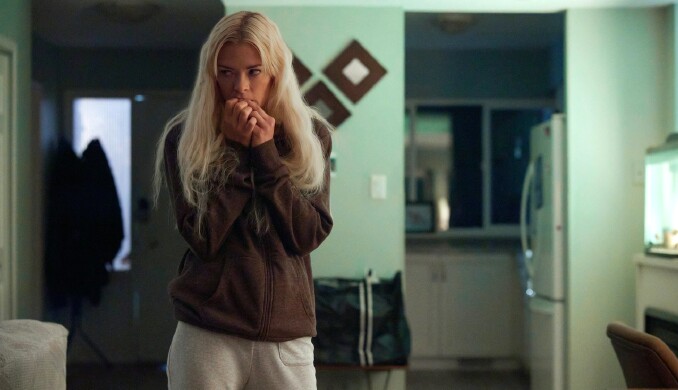Jaime King on Why Lifetime's "Hoax: The Kidnapping of Sherri Papini" Was an Important Story to Tell

Lifetime's Notorious Women programming event continues this weekend with the premiere of Hoax: The Kidnapping of Sherri Papini. Based on the 2016 "kidnapping" of the Redding, CA, mother of two, the film explores what happened to her, while offering the reasons behind why she would fake her own abduction. For actor Jaime King, who portrays Papini, taking a sympathetic approach to Papini's actions and the ensuing story was tantamount when accepting the role. "This [project] is quite interesting because a news article about it just popped up one day, [and] as soon as I read it, I really felt something was off in the way that the [media] conveyed this woman," she explained while recently promoting the film.
"At first I thought, 'I should option the story for my production company, as someone needs to tell [her] story,'" she continued. "But again, the way she was portrayed [in the press] didn't seem accurate to me. They weren't getting to the truth of it. It was just a headline. Cut to less than 24 hours later, I get an offer from our beloved Tanya [Lopez] at Lifetime for this film. It was like kismet, and totally meant to be."

After reading the news story, King began a personal deep dive into the events, and Papini's story hit a nerve. How could an apparently happily married mother, and an inspiration to her friends, fake her own kidnapping? There had to be more to it. "When my manager explained the story, I was like, 'Wait, I’ve already been doing the research on this for the past, like, 24 hours,'" she recalled. "I think what's important about these [movies], and these stories, is the opportunity to explore all the aspects and sides, then let the audiences decide. It also gives a voice to people that have had their voices taken away.
"Someone like Sherri, who is [now] a felon, her likeness, any rights she has, her life, we're stricken from her," King continued. "As storytellers, it's our job to tell the best we can of all sides of things. So, yeah, there's something that resonated with me about her, and ultimately, I felt that the media was not really taking account of her mental health or other contributing factors. The salaciousness to her story … I felt like she was being muffled, and that some part of the story was missing -- meaning her voice. The media has a way of taking stories and, for better or for worse, the person becomes obsolete, yet they're the star of it and that really upset me."
As the film explores, Papini seems consumed with painting the perfect picture of domestic bliss, and in doing so somehow loses herself in it. Feeling helpless, she runs away with Chris (Joshua Collins), an ex-boyfriend, only to feel the pull of motherhood, which makes her realize it was a huge mistake. After three weeks of "confinement" Papini reappears, regaling tales of abuse by two Hispanic women who had taken her while jogging. That's where the real ordeal begins. As investigators uncover discrepancies in her story, they discover a long history of self-abuse and pathological lying. Only this time, Papini hasn't just hurt herself. She has also divided a community and wasted a lot of law enforcement resources.
"I'm like, this is a mother, and no one makes that choice for no reason," King asserted. "I went down that rabbit hole just as a human being because I was tired of so many voices that aren't heard. I watched every interview, everything while doing this. Again, if you're a felon you have no rights to your name and likeness. Portraying her, I had to connect to what I believe was the truth of her that met the truth in me, and maybe give people an opportunity to take a look, as there's always something deeper.
"You can make fun of mental health issues," she added. "You can deny abuse issues, but I'm simply not willing to do that. As a storyteller, to be able to present it in a real way and then give it back to the audience … We're just reflecting humanity back to humanity, and they can decide what happened. This project allowed that. It was important to me to not have her humanity taken away just because [it was] decided it was a good press clip."
According to King, the role was a hard one to shake off at the end of the day, especially as Papini was literally in her head. "For me it was hair extensions," she said. "These long extensions that were down to like my waist. I'd wake up at 6 a.m. crying from the weight of these things. That sounds traumatic, but at the end of the day, you do want to release from the character, but [I couldn’t] because they're literally in your head. You're immersed in it and just surrender to that process."
Unlike a lot of her work, King did watch Hoax. As a producer, it was her duty, but on a greater level, she needed to walk away feeling like she'd achieved her goal. "This one was for her … as her advocate," she offered in closing. "It was so important to me to know I could rest easy; that if ever [Sherri] sees it, that through the studio, I was allowed to give her some kind of a voice and make sure I did a decent job."
Hoax: The Kidnapping of Sherri Papiniwill be telecast Saturday, January 28 at 8 p.m. on Lifetime as a part of their Notorious Women programming event.
Click the social buttons to share this content with your friends and colleagues.
The opinions and points of view expressed in this content are exclusively the views of the author and/or subject(s) and do not necessarily represent the views of MediaVillage.com/MyersBizNet, Inc. management or associated writers.


